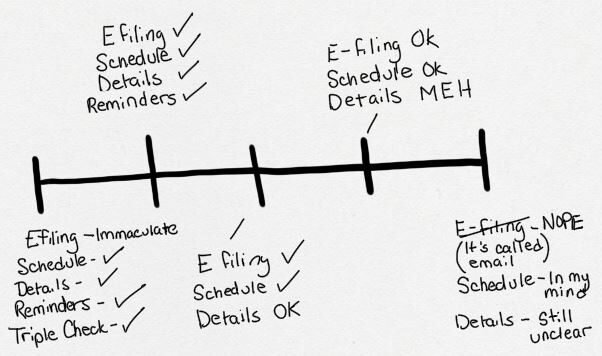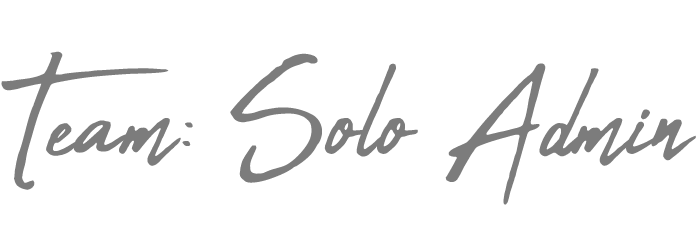Let’s be real. As an admin, you need a bunch of soft skills. In my experience, there are a few that are absolutely crucial for survival. Without these skills, life is harder for everyone involved. My top key skills of an administrative assistant are:
- How to person (Customer service)
- Professionalism
- Organization
- Reliability
How to Person
This skill was always harder for me because I fully admit that I am not an “every person” kind of person. I just want to kick my task list’s ass, be an admin “Captain Save-a-Co(lleague),” and go home. IS THAT TOO MUCH TO ASK?
The answer is yes.
For some admins, the social part is one of the best parts of being an admin. But there are admins who do not consider that to be best part (like me!!), and that is okay!
You don’t have to want to know everything about people, or take on someone else’s day or emotions to be a good admin (though that is EXACTLY what happens most of the time). In fact, it’s almost taboo to say that you’re not a people person in our profession.
Well, being good at “personing” is not who you have to be. It is simply a key skill of an administrative assistant that you can learn (much like communication). It takes practice, but anyone can be good at “personing,” if they practice.
So How Do I Person Successfully?
“When they go low, I go high.”
That’s right. I harness my inner Michelle Obama. Though I change that sometimes with “When they go low, I go away.”
Not every fight is worth fighting. Ultimately, all you can do is your job and point out the warning/helpful bits. If they choose to ignore it, let them. Be honest, genuine, and courteous and let them know. Ultimately, the final decision isn’t your responsibility. You are, at most, an advisor.
No, that doesn’t mean you don’t care about the company, department, or project, but if every decision is a fight because you don’t agree, imagine the type of environment you’d end up working in.
Over time, if your opinion was right, they’ll learn to listen to you and consider your suggestions more often. If your opinion was wrong, you didn’t make it a big enough deal to feel embarrassed about, but you still voiced your opinion.
In my experience, people appreciate the room to feel more accountable when I give them the space to take ownership of a decision and not fight them. They felt as if I respected them and their opinion.
That took a long time to learn, and, in truth, I still have to work to remember this. At work, I like to be in control regarding my work, how I spend my time, and my responsibilities, and I forget that there are other things/people to consider.
A very humbling tidbit to remember.
Learn How to Communicate Both Verbally and in Written Format
Looking back, I realize now just how unaware I was when I started out as an admin.
I honestly believed people paid attention to my world/tasks more, so I made assumptions in my communications with others. After all, how could anyone NOT know what I’m talking about on this administrative task that you did not know that I was even doing???
Fact is, most people aren’t really aware of the tasks they given you. They just want the task they assigned to you completed as quickly as possible. There are, of course, micromanagers, who defy this (and most) logic, but most times, people just want the result fast and correctly for their prioritites.
I’m more aware now, but it’s still hard to remember. Now, when I write an email or am explaining something to a colleague, client, vendor, etc. I make sure I minimize assumptions and opportunities to be vague. How, you ask?
CLUTCH TIP: If you write or say the word “it,” “this,” or “that,” replace it with the actual noun you’re referring to if the noun wasn’t already in the same sentence.
Even if something seems redundant, write it all out anyway. Hell, add pictures if you need to, but take the time to make sure you did your best to explain things as if you were explaining the situation to a new person.
That’s how.
Acknowledge that Words are Hard
There are soo many times where our message really needs to be understood. For example, during a performance evaluation or discussing an awkward topic with a colleague or your manager.
Practice what you want to say beforehand.
I mean, seriously, we plan and prepare everything else. Why would you choose to wing it when you have a point you need others to understand?
SHOW THOSE WORDS WHO’S BOSS!!
Professionalism
“There’s a time and place for everything.”
The way we present ourselves is up to us. If you want to be taken seriously, it helps if you take yourself seriously.
No, I’m not talking about your attire. I’m referring to creating and maintaining high integrity and excellent reputation in the quality of your work and behavior.
Do you want to be thought of as an admin with a negative attitude, unproductive, and unreliable? I hope not.
Be the person who you are proud of. Because even if your current manager doesn’t see your value and quality, someone else will. Never give someone a reason to make you appear less than who you are and what you deserve, and only you can determine what that value is.
You have nothing to prove to others either. You know you’re talented, smart, resourceful, and intelligent. Our profession often places us with people who forget or assumes we aren’t. That’s unfortunate, but that’s a “them” problem, not a “you” problem.
(While this solution might not make some happy, it’s worth considering. If it isn’t right for you, that’s fine. I know people who do not agree with me, but I believe it’s important enough to mention to you.)
If you’re right, then that’s just a fact. There’s no point in arguing.
- State your facts,
- Give your opinion based on those facts, and
- Let it go, and move on.
If you are the type of person (the “I have to be right and make you admit I’m right” kind of person), the environment you’re creating could be considered unnecessarily negative, and IT’S EXHAUSTING.
Be mindful to not turn “them” problems into “you” problems.
Organization
Regardless of your preferred organization style, make damn sure that you always are.
Some of us thrive in various points along the spectrum of organization.

Wherever you fall on the spectrum, make sure it works for you. Attempt to make sure things are organized in such a way that someone else could pick up where you left off (if you can). Often, the person who is picking up where you left off is you in the future, and you want to make sure that you are setting yourself up for success.
As you all know by now I just Trello (not sponsored) as my organization tool of choice. I have set it up as my virtual administrative back up. Check out my post about it and how I use Trello as an admin.
It’s incredibly frustrating when you’ve done the work, only to not be able to find information when you need it (then you find it after you redid all the work).
Seriously though, even if you lack many other skills, the simple act of being organized and making sure things don’t slip through the cracks can carry you through the grand majority of most admin positions.
Which brings me to the last pick…
Reliability
The last key skill of an administrative assistant is being consistent. This is a topic I’ll cover a lot, as it is often the clutch element of being a great admin.
No matter what you do, you can be an average-good admin if you reliably stick to the other soft skills I already picked.
Most humans love routine, so if you’re able to offer your clients and colleagues a reliable routine, you’re already ahead of the game. By offering consistent reliability, you are simultaneously building trust, rapport, and a positive reputation. Conversely, this can also be have an extremely negative outcome if your performance is consistently shit, so quality is key.
I hope you all enjoyed my top 4 soft skill picks. What do you think? What would you list as your top 4 key skills of an administrative assistant? Let me know in the comment section.
Thanks for reading and I hope you have an awesome sauce day!
Photo by Superkitina on Unsplash


